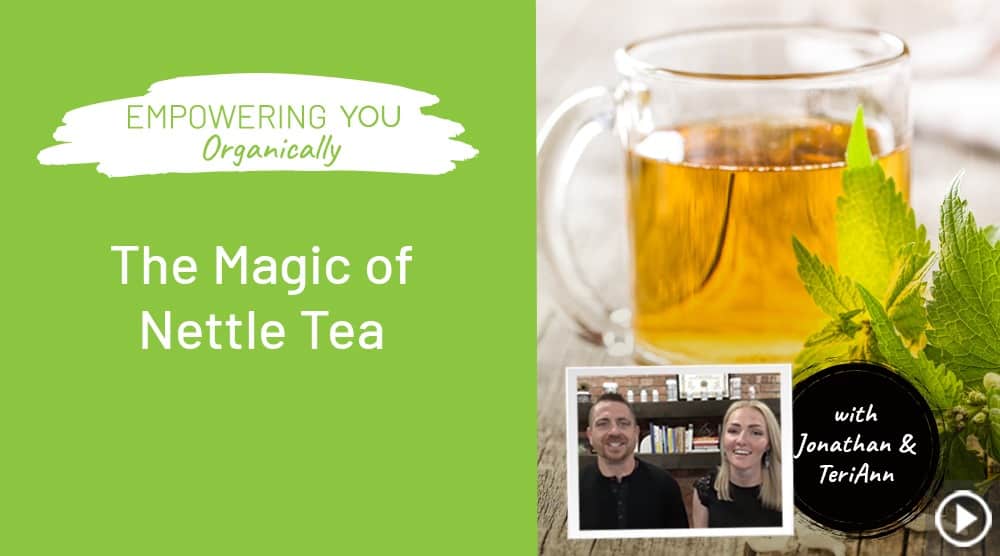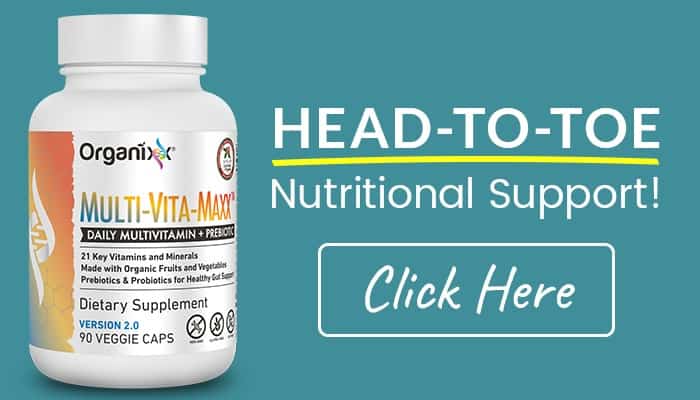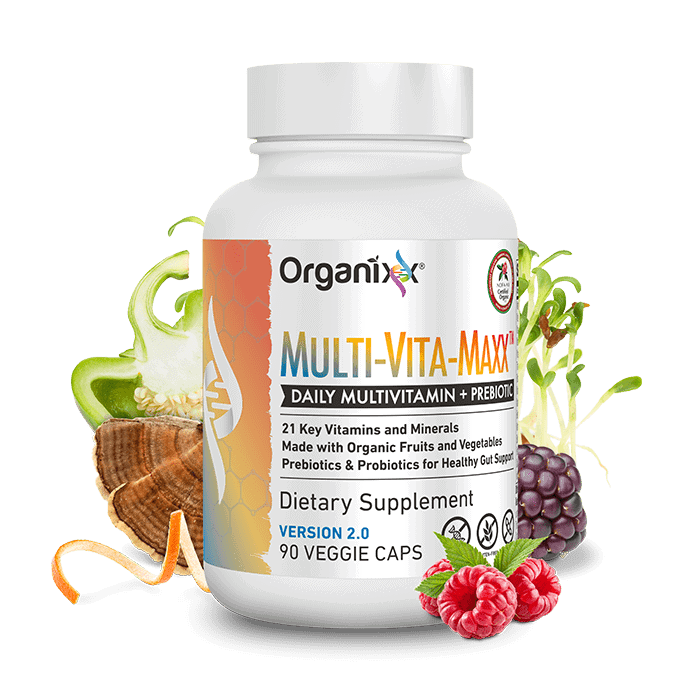Empowering You Organically – Season 11 – Episode 92
Title: The Magic of Nettle Tea
Hosts: Jonathan Hunsaker & TeriAnn Trevenen
Guest: None
Description: If you’ve had the experience of walking through a meadow or trail in the woods and found yourself with a bristly rash on exposed parts of your limbs, you may have brushed up against some stinging nettle. Nettles are an herbaceous perennial flowering plant, native to Europe, Asia, northern Africa, and North America. Tune in to learn how nettles actually support vibrant health!
* * *
FEATURED PRODUCT
Total Body Fuel Containing Vitamins and Enzyme-Activated Materials to Provide Critical Nutrients to Your Body
- Whole food supplement with ZERO synthetic ingredients
- 21 uniquely fermented vitamins and enzyme-activated minerals
- Made with 8 organic superfoods and botanicals
- Patent-pending fermentation process maximizes potency and absorption
- Replaces your current multivitamin, vitamin C, B complex, D3, and any whole food fruit & veggie supplement
- Prebiotics and probiotics support overall gut health
- Non-GMO; No fillers, additives, artificial flavors, preservatives, colors, yeast, soy, sodium, or starch
* * *
What is nettle?
Nettle, or stinging nettle, is a shrub that comes from northern Europe and Asia. Its scientific name is Urtica dioica.
If you’ve had the experience of walking through a meadow or trail in the woods and found yourself with a bristly rash on exposed parts of your limbs, you may have brushed up against some stinging nettle. Nettles are an herbaceous perennial flowering plant, native to Europe, Asia, northern Africa, and North America.
The plant has many hollow stinging hairs called “trichomes” on its leaves and stems, which act like needles that inject histamine, formic acid and other chemicals that produce a stinging sensation. It’s very high nutritional content has made it a popular food source steamed and eaten like spinach (it does loose the “sting” when cooked), taken as a tea made from the dried leaves to assist in the nutrition of expectant or nursing mothers, or for general tonic properties for good health.
The leaves, stem, or root from the nettle plant can be crushed and made into powders, tinctures, creams, teas, and more. While people have used it for centuries as an herbal medicine, modern research also supports many of the potential health benefits of nettle and nettle tea.
Stinging nettle’s leaves and root provide a wide variety of nutrients, including:
- Vitamins: Vitamins A, C and K, as well as several B vitamins
- Minerals: Calcium, iron, magnesium, phosphorus, potassium and sodium
- Fats: Linoleic acid, palmitic acid, stearic acid and oleic acid
- Amino acids: All of the essential amino acids
- Polyphenols: Kaempferol, quercetin, caffeic acid, coumarins and other flavonoids
- Pigments: Beta-carotene, lutein, luteoxanthin and other carotenoids
What’s more, many of these nutrients act as antioxidants inside your body.
Antioxidants are molecules that help defend your cells against damage from free radicals. Damage caused by free radicals is linked to aging, as well as cancer and other harmful diseases.
Studies indicate that stinging nettle extract can raise blood antioxidant levels.
Top 5 Benefits of Nettles
1. Urinary tract health
Nettle may help flush harmful bacteria from the urinary tract. This can benefit people who have urinary conditions, such as benign prostatic hyperplasia (BPH). BPH causes an enlarged prostate gland in men. This can cause pain or other problems urinating.
According to one 2013 study men with BPH who took nettle extract had fewer clinical symptoms than those who didn’t.
Nettle may also help support any medications you’re taking for infections or conditions related to the urinary tract. Talk to your doctor first about any possible interactions between herbal remedies and medications you take.
2. Arthritis and pain
Nettle has historically been used to treat pain and sore muscles, especially related to arthritis. The Arthritis Foundation suggests that nettle tea may also reduce the inflammation and pain association with osteoarthritis.
3. Blood sugar management
Nettle has shown some promising effects on blood glucose levels. It may help the pancreas make or release more insulin, the hormone that lowers blood sugar.
In a 2013 study, nettle leaf extract lowered blood glucose and A1C in a group of people with type 2 diabetes who were taking insulin as well as oral diabetes medications.
4. The power of polyphenols
Nettle is high in plant chemicals called polyphenols. A review of the research on polyphenols suggests that these powerful compounds may play a role in the prevention and management of chronic diseases related to inflammation, such as diabetes, obesity, cancer, and heart disease.
In particular, polyphenols from nettle extract have shown some exciting potential for treating breast cancer and prostate cancer. Plants like nettle also contain potent antioxidants, which are substances that protect the body from aging and cell damage.
5. May Treat Hay Fever
Hay fever is an allergy that involves inflammation in the lining of your nose.
Stinging nettle is viewed as a promising natural treatment for hay fever.
Test-tube research shows that stinging nettle extracts can inhibit inflammation that can trigger seasonal allergies.
This includes blocking histamine receptors and stopping immune cells from releasing chemicals that trigger allergy symptoms.
However, human studies note that stinging nettle is equal to or only slightly better at treating hay fever than a placebo.
While this plant may prove a promising natural remedy for hay fever symptoms, more long-term human studies are needed.
How to make nettle tea
You can buy nettle tea loose or in teabags, but you can also grow or harvest the leaves yourself. With fresh leaves, experiment with the ratio of nettle to water you prefer, but a general reference is two cups of water for every cup of leaves. Here’s how:
- Add water to the leaves.
- Bring the water just to a boil.
- Turn off the stove and let sit for five minutes.
- Pour the mixture through a small strainer.
- Add a bit of honey, cinnamon, or stevia, if you like.
Start out by only having one cup of nettle tea to make sure you don’t have any reactions to it.
Warnings
Be sure to talk to your doctor before you try any new herb or supplement. Even all-natural foods and drinks like tea can cause allergic reactions or interact with certain medications. Some herbs and supplements can be harmful to people with certain health conditions.
***
Subscribe to Empowering You Organically
Never miss an episode!
APPLE PODCASTS SPOTIFY GOOGLE PODCASTS





